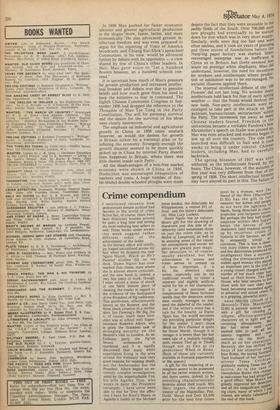Crime compendium
I mentioned recently how predominant female authors had become in the world of crime fiction but, of course, there have been dominant women around for quite a long time and among the most enduring best sellers as well. Three books under review this week suggest rather different sides of the achievement of the ladies.
As the literary editor will testify, joy leaped unconfined across my face when he dropped the new Ngaio Marsh, Black as He's Painted (Collins E2) on my desk. Dame Ngaio has now reached that classic state where she is almost above criticism, and the new book is, indeed, a very fine piece of work, though I must record a sense of shock at one fairly blatant piece of cheating the reader in regard to the evidence of the bodyguard of the President of Ng'ombwana. This gentleman, affectionately known as the Boomer, and the finest black creation in a thriller since Ian Fleming's Mr Big (he is, of course, much more loveable) was at school with Superintendent Roderick Alleyn, who is given the thankless task of arranging security on the Boomer's visit to London. At an Embassy party the Ng'om
bwana " ambassador is murdered, and it is rapidly discovered that many white expatriates living in the area around the Embassy had very good reasons for wishing death, not the Ambassador but the President. Alleyn begins an extremely complex investigation, aided by the imperturbable Fox, his wife Agatha Troy, who wants to paint the President (strangely, I have never been able to feel for Troy the affection I have for Rory's Mama or Appleby's Judith in the Michael
Innes books), the delectable Mr Whipplestone, a retired FO official and the latter's delectable cat, Miss Lucy Lockett.
Dame Ngaio has an extraordinary gift for the drawing of characters just this side of eccentricity (and sometimes those on just the other side, as in Skuleit of Lampreys), as well as an amazing sense of the visual: her atmospheres and scenic set pieces are always pure magic. Her detection is, of course, usually excellent, but her achievement in scenes and tones serves to remind us of how important it is for the detective story writer, expecially one in the traditional mould, to create a separate and slightly artificial world for his or her characters. It is in the precision and completeness ot these fictional worlds that the detective writer most readily manages to suspend the disbelief of the reader, and if the writer's mind has a turn for the bizarre, as Dame Ngaio has, the world becomes one providing particular delight for the reader. I don't think Black as He's Painted is quite the finest Marsh, though it is vintage: it is better than her last weird tale of a multiple football pools winner Tied up in Tinsel, though not as fine as its predecessor When in Rome. (Both of these are currently available in Fontana paperbacks at 30p apiece.) A gift for the rendering of atmosphere seems to be possessed by all the better women writers, and there seems, indeed, to be something characteristically feminine about their touch. Mrs Mary Ingate, the deserved winner of the Macmillan, Pan, Dodd, Mead and Dell £2,500 prize for the best first crime
novel by a woman, wan The Sound of the Weir (Macmillan £1.95) has the gift in full measure: her scenes and people do not have the lightness of Marsh, being drenched in claustrophobia and incipient terror: like perhaps the best half dozen suspense writers Mrs Ingate keeps the nerves of her characters (and readers) strung up by recurrent crises of
by tyysteraiarrainpetnhteherotrintveta, trivial off
occurrences. This is less a detective story (there are no clues, and few discoveries produced bY intelligence) than a mysterY, telling the reminiscences of a middle aged woman who played aanyoimunpgorctoaunstinpacrhtairngedthewtirtihaloll murder of her much older hus; band at their home, The Oh House, who later returns to live there with her own older band, becoming enmeshed agel,11 in potential and actual crime. It is a gripping, powerful storY• Anne Morice (Death of a with e.9a5)t, eai sn lanothergyi gift forM f7or w, coinreaaactni mn wgi lrli tiasetir, telligent, affection-generating tcehrtaraaincttnegrs seattminnslpighhertesand eil seemed talents atbolgeneetvhteoerr until 1.113°Ilvit centrate on thepuallsntdoarlY1 her much as on her characters• fRecently,ocus o fh sehre attentionh a s sh i shifted eda wtahycei from Robin, the boring Scotian Yard husband of her narrator, actress Tessa Crichton, gradually making Tessa the rle; tective. As in the case 0' Gwendoline Butler this change in good effect: im as Miss mdaoltrotcegethhears a agnreda tal yl the nosytegdn fhtec ar ndte at epcpet oa rcin ing clues, many of which I "et the dsseend, of this book.h a


































 Previous page
Previous page